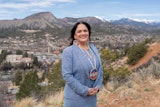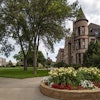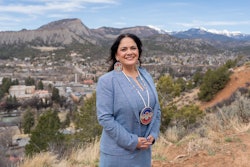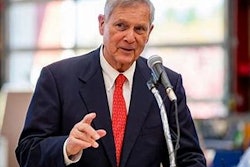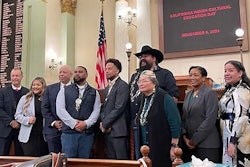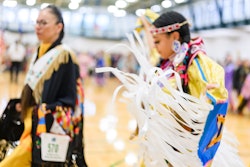HOUSTON – Members of ACPA-College Student Educators International are examining their roles in social justice work and race equality within the ranks of higher education as they gather for their annual convention this week.
Some of the nearly 2,000 attendees spent part of the day Monday caucusing to get a sense of what it means to be themselves as they work with students.
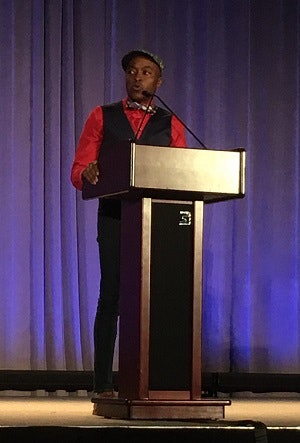 Dr. Stephen John Quaye, ACPA president
Dr. Stephen John Quaye, ACPA president“Caucusing is where folks of similar racial identities get together to talk about their experiences and understanding their own race,” said Chris Moody, acting executive director of ACPA. “For me to be a White male, it helps for me to understand how my White maleness shows up in my relationships with people, my leadership style and my work setting… How I navigate issues of difference through race.”
Moody, who works in higher education administration at American University, said the national political and social climate in U.S. has grown more volatile in recent years. He said the goal is to “have people be more aware of how race shows up.”
“I think we believe the world is colorblind…as much as we want to pretend that we are in a post-racial society,” he said. “Barack Obama was president, people have rights, but it still isn’t. We are trying to create space to name it, understand it, so that we can be more mindful and be better citizens together.”
The heightened awareness and breakout sessions on self-awareness come at the right time for the Arab-Middle Eastern, Black, African, Asian, biracial and multiracial students and others attending the conference.
“College campuses can be a frightening place. Living here (in America) can be frightening at times,” said Malik Abdul-Nasir, a 24-year-old senior business major attending an East Coast school. “Those of us who seek to be educated and serve humanity are often viewed with suspicion. This should not happen where we attend school.”
Following the caucuses Monday, participants gathered for a townhall-style discussion.
“Today, we are here to get feedback from you,” Dr. Jamie Washington, ACPA’s current vice president and incoming president, said during the meeting.
Ideas gathered from the caucuses will be discussed later in the week.
People who share ethnicity, background and other similarities often attend the same schools and churches and live in the same neighborhoods, Moody noted. He said this is the first time ACPA has taken on the task of confronting racial and social injustices.
“We repeat this over and over again throughout the United States. I think it happens in education, too,” he said. “That’s exactly what we are trying to get at. Because it’s hard work, it’s difficult work, it’s challenging work. We think it is better to start in safer spaces pulling folks together so they can be open and honest without being concerned about further marginalization or being silenced by the majority voices in the room.”
ACPA chair Raymond Plaza said his team consists of 70 people from throughout the U.S. and Canada who cover programing, equity and inclusion, member engagement marketing, career central and convention experiences. “We have an indigenous adviser, and the heads of each of those groups plus the adviser are a part of my steering team. I have two admin team members and then myself as chair.”
But it wasn’t just the steering committee that wanted this year’s focus to be on decolonization and racial justice, said Plaza.
“Some of that was beyond us,” he said. “It was in early November of 2016 when the ACPA governing board had their retreat. Out of the retreat came the initial conversation about the need to do a strategic imperative on racial justice. At that time, my team was just forming. It was too late to do anything at the 2017 convention. So at the 2017 convention in Columbus, they had this series of listening sessions to get feedback from members about what this would mean.
“After the ’17 convention, some groups felt that the strategic imperative for racial justice didn’t capture everyone. It didn’t cover our Native indigenous students …that’s where the decolonization piece was added. I think what we’ve tried to do is make sure that it’s a thread throughout. The convention is one of the association’s largest events. Our goal was to begin to align with the direction that the association is moving.”
Over the years, most of the association’s programs have revolved around social justice and inclusion, he said.
“We try to ensure that there is a balance of all the 12 competencies and all the different student affairs functional areas. We could easily have all our conferences fit into one, but we need to ensure that there is a breadth of those pieces. We started thinking about the things we could do. That’s where caucusing comes in and intentionally thinking about our speakers and what they are talking about.”
It’s all a continuation of the ongoing processs of engaging and learning.
“In many ways we don’t know what decolonization means,” Plaza said. “Some communities do, but others don’t. Our hope is that folks who are a part of this, that are here attending – knowing that there were a number of colleagues who were not able to make it for a variety of reasons – will help the association move forward, and there will be other opportunities for members to continually engage.”
The dismantling of the racial structures that plague education will take time, he said.
“You don’t just dismantle structures overnight. It’s almost like when you throw a rock into a lake. There is that ripple,” he said. “We represent 22 different countries. We know that each institution is unique with their own culture and their own structure. But our hope is that these things will resonate and individuals will take that and engage their staff and students. We have faculty here engaged in classrooms. We have graduate students and undergrads, so it’s an opportunity to really think about how we continue learning and unlearning some of these things.”
